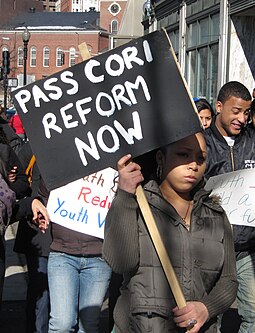Probation in criminal law is a period of supervision over an offender, ordered by the court often in lieu of incarceration. In some jurisdictions, the term probation applies only to community sentences, such as suspended sentences. In others, probation also includes supervision of those conditionally released from prison on parole. An offender on probation is ordered to follow certain conditions set forth by the court, often under the supervision of a probation officer. During the period of probation, an offender faces the threat of being incarcerated if found breaking the rules set by the court or probation officer.

Deval Laurdine Patrick is an American politician who served as the 71st governor of Massachusetts from 2007 to 2015. He was the first African-American Governor of Massachusetts and the first Democratic governor of the state since Michael Dukakis left office in 1991. Patrick served from 1994 to 1997 as the United States Assistant Attorney General for the Civil Rights Division under President Bill Clinton. He was briefly a candidate for President of the United States in the 2020 U.S. presidential election.

Kerry Murphy Healey is an American politician and educator serving as President Emerita of Babson College. She previously served as the 70th lieutenant governor of Massachusetts from 2003 to 2007 under Governor Mitt Romney. A former member of the Republican Party, she was the party's nominee for Governor of Massachusetts in the 2006 gubernatorial election, but was defeated by Deval Patrick.

The American juvenile justice system is the primary system used to handle minors who are convicted of criminal offenses. The system is composed of a federal and many separate state, territorial, and local jurisdictions, with states and the federal government sharing sovereign police power under the common authority of the United States Constitution. The juvenile justice system intervenes in delinquent behavior through police, court, and correctional involvement, with the goal of rehabilitation. Youth and their guardians can face a variety of consequences including probation, community service, youth court, youth incarceration and alternative schooling. The juvenile justice system, similar to the adult system, operates from a belief that intervening early in delinquent behavior will deter adolescents from engaging in criminal behavior as adults.
In the common law legal system, an expungement or expunction proceeding, is a type of lawsuit in which an individual who has been arrested for or convicted of a crime seeks that the records of that earlier process be sealed or destroyed, making the records nonexistent or unavailable to the general public. If successful, the records are said to be "expunged". Black's Law Dictionary defines "expungement of record" as the "Process by which record of criminal conviction is destroyed or sealed from the state or Federal repository." While expungement deals with an underlying criminal record, it is a civil action in which the subject is the petitioner or plaintiff asking a court to declare that the records be expunged.
A presentence investigation report (PSIR) is a legal document that presents the findings of an investigation into the "legal and social background" of a person convicted of a crime before sentencing to determine if there are extenuating circumstances which should influence the severity or leniency of a criminal sentence. The PSIR is a "critical" document prepared by a probation officer via a system of point allocation, so that it may serve as a charging document and exhibit for proving criminal conduct. The PSIR system is widely implemented today.

The Ministry of Justice (MoJ) is a ministerial department of the Government of the United Kingdom. It is headed by the Secretary of State for Justice and Lord Chancellor. Its stated priorities are to reduce re-offending and protect the public, to provide access to justice, to increase confidence in the justice system, and to uphold people's civil liberties. The Secretary of State is the minister responsible to Parliament for the judiciary, the court system, prisons, and probation in England and Wales, with some additional UK-wide responsibilities, e.g., the UK Supreme Court and judicial appointments by the Crown. The department is also responsible for areas of constitutional policy not transferred in 2010 to the Deputy Prime Minister, human rights law, and information rights law across the UK.

The Sensible Marijuana Policy Initiative, also known as Massachusetts Ballot Question 2, was an initiated state statute that replaced prior criminal penalties with new civil penalties on adults possessing an ounce or less of marijuana. The initiative appeared on the November 4, 2008, ballot in Massachusetts.
The Boston Foundation is a community foundation established in 1915. Serving the city of Boston, Massachusetts, it is made up of nearly 1,100 separate charitable funds established by donors over more than 100 years. Funds are set up for the community or for special purposes, such as supporting individual non-profit organizations or particular causes. Since 2001, the Boston Foundation has commissioned and published research, hosted forums and platforms for discussion and public policy development, and joined or formed coalitions addressing issues around individual-, systems- and root-level causes of inequity facing Boston and the region.
A sex offender registry is a system in various countries designed to allow government authorities to keep track of the activities of sex offenders, including those who have completed their criminal sentences.

Katherine Marlea Clark is an American lawyer and politician who has served as House Minority Whip since 2023 and the U.S. representative for Massachusetts's 5th congressional district since 2013. She previously served as Assistant Speaker from 2021 to 2023 and Vice Chair of the House Democratic Caucus from 2019 to 2021. Clark was a member of the Massachusetts House of Representatives from 2008 to 2011 and the Massachusetts Senate from 2011 to 2013.
The Boston Workers Alliance of Boston, Massachusetts, is a "community organization led by unemployed and underemployed workers fighting for employment rights." Based in Boston's low-income neighborhood of Grove Hall, Roxbury, it acts as an unemployed-workers' union, providing direct services, incubating new businesses and leading organizing campaigns led by its membership.

Suzanne M. Bump is an American politician who served as Massachusetts State Auditor from 2011 to 2023, the first woman elected to this role in the state's history. She is also a former State Representative and state Secretary of Labor and Workforce Development.

The Boston Municipal Court (BMC), officially the Boston Municipal Court Department of the Trial Court, is a department of the Trial Court of the Commonwealth of Massachusetts, United States. The court hears criminal, civil, mental health, restraining orders, and other types of cases. The court also has an appellate division which reviews questions of law that arise from civil matters filed in the eight divisions of the department.
Expungement in the United States is a process which varies across jurisdictions. Many states allow for criminal records to be sealed or expunged, although laws vary by state. Some states do not permit expungement, or allow expungement under very limited circumstances. In general, once sealed or expunged, all records of an arrest and of any subsequent court proceedings are removed from the public record, and the individual may legally deny or fail to acknowledge ever having been arrested for or charged with any crime which has been expunged.

The Massachusetts Trial Court Probation Service, more commonly referred to as the Massachusetts Probation Service (MPS), is the Commonwealth's primary supervisory law enforcement agency. Created in 1878, it is the first Probation agency established in the United States. The service was created based on the work of John Augustus, the Boston area bootmaker who is credited as the "Father of Probation".
Community Resources for Justice is a Massachusetts-based organization that has worked for over 130 years in social justice in issues like ex-offender re-entry, prison conditions, public safety, and crime prevention. CRJ was formed through the merger of several older organizations in the Boston and New England area, and while most of its work today is focused in the northeastern United States, CRJ is also engaged in work in other states around the nation.

Criminal justice reform seeks to address structural issues in criminal justice systems such as racial profiling, police brutality, overcriminalization, mass incarceration, and recidivism. Reforms can take place at any point where the criminal justice system intervenes in citizens’ lives, including lawmaking, policing, sentencing and incarceration. Criminal justice reform can also address the collateral consequences of conviction, including disenfranchisement or lack of access to housing or employment, that may restrict the rights of individuals with criminal records.

The movement to reform sex offender laws in the United States describes the efforts of individuals and organizations to change state laws requiring Sex offender registries in the United States.
The Massachusetts Institute for a New Commonwealth, or "MassINC," is registered as a non-profit 501(c) organization that functions as a nonpartisan, evidence-based think tank. Its mission is to develop a public agenda for Massachusetts that promotes the growth and vitality of the middle class. Its governing philosophy is rooted in the ideals embodied in the American Dream: equality of opportunity, personal responsibility, and a strong commonwealth. Their mission is to promote a public agenda for the middle class and to help all citizens achieve the American dream.











